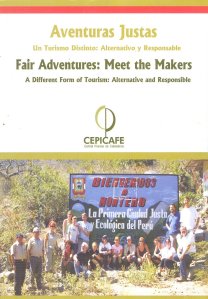Our coffee co-op partner, CECOVASA has just received an award for the impact their work has had on promoting and protecting bio-diversity in the region. The award was presented to them by Alan Garcia Perez, President of Peru. We have just received the following press release about this impressive accomplishment which we have translated below from its original Spanish. For more information about CECOVASA, click here.
CECOVASA WINS NATIONAL BIOTRADE PRIZE
On World Environment Day

On June 5 at the National Palace, Cecovasa was awarded first place in the category for businesses dedicated to biotrade. This competition was organized by the Ministry of Environment and participants included 152 different businesses and communities located in 19 regions around the country. Cecovasa won the prize in the category for businesses, the Junín Pablo de Ucayali community and the San Juan Bautista (Loreto) municipality won prizes in the categories for communities and local governments, respectively. The prize was awarded by the Peruvian President in the presence of the Minister of Environment, Ambassadors, Congress people, and hundreds of intellectuals and individuals that are well known for their defense of the environment and promotion of sustainable businesses.
The Minister of Environment, Antonio Brack, said that this is the first time that the competition is being held. He said that Peru has a rich biodiversity that allows for the country to generate wealth and move its people out of poverty.
The President (though we don’t believe it) said the following: “the environment is a fundamental issue for the future and, therefore, a fundamental issue for the government.” The Chief of State, Alan Garcia Perez, highlighted the work that is being done by those who promote biodiversity using biotrade and added, “this is included among the government’s objective—the defense of Peru’s biodiversity.” He then said that our country is an “extraordinary bank that allows us for an almost infinite amount of goods, some domesticated throughout history, others built by the original population of Peru, and others in the process of investigation and recognition.”
In speaking with the press, Cecovasa president Agustin Mollinedo Trujillo expressed satisfaction for this recognition. “Cecovasa is made up of small producers. We are farmers that work the land; but we are winners. We have an average of 2 hectares ( less than 5 acres) of coffee and we have created the most successful biotrade business in Peru. Small-scale agriculture is not only possible, it is sustainable when there exists an economy of scales and an effort to reach markets that pay more money and demand higher quality.” Mr. Mollinedo asserted that, during 2008-2009, exports reached US$14,876,118. Of this amount, US$8,448,958 was generated from sales of organic coffee gathered by the 1,934 members that participate in the Organic and Sustainable Coffee Program.

Upon being asked about the needs of the producers, the Cecovasa President expressed that what is most needed is communication channels that are in good condition. “We spend as many as 18 hours traveling 350 kilometers to transfer coffee from Putina Punco to Juliaca. If the Sina-Yanahuaya highway were built, this trip could be made in 12 hours. Mollinedo congratulated the producers and leaders of the grassroots co-operative, the leaders of the Organic Program, and the Technical Department—especially Leonardo Mamani, head of Projects. The Cecovasa president said, “our members have children who have become professionals and this is providing us with results that are favorable for everyone.”
Mr. Leonardo Mamani said that the prize awarded to Cecovasa is in the amount of US$ 15,000, “but this has not been given in cash, rather it will be used for trainings and for the purchase of equipment in accordance to the plan that we presented.” Mamani said that in order to achieve this award, we have undergone a rigorous evaluation. “The inspectors traveled to the production zone and saw the work in the fields, the work of the technicians, the work of the cooperatives. The verification process then moved to Lima, where they saw the dry processing that, though it does not belong to us, is in accordance with environmental standards and good treatment of workers. Leonardo concluded, “We are champions in biotrade, we are Cecovasa: Quechua and Aymara coffee from Peru.”








